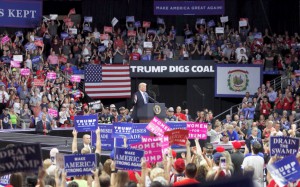
At a rally in West Virginia, President Trump got the price of a Camaro in China wrong, missing the mark by 50%, while trying to make a point about tariffs.
U.S. Presidents have a long history of not being in touch with the prices of day-to-day items used by Americans. After last night, Donald Trump is clearly no different.
Speaking at a Trump re-election rally in West Virginia, he told the partisan group of supporters in attendance that a new Chevrolet Camaro costs $119,000.
“When we make a car, we sell it into China and there’s a 25% tariff and that’s just the beginning,” he said in a speech in West Virginia, adding the Camaro costs three-times as much as it sells for in the U.S. “You understand that, right? It’s all taxes, taxes and taxes. We can’t do that anymore.”
According to Bloomberg, he’s only off by 50%. There is only one Camaro model available in China – it comes equipped with a 2.0-liter turbo – and it costs $58,430 in China, GM officials told Bloomberg. The same vehicle starts at $25,905 in the U.S.
(China locks down American-made Mercedes-Benz SUVs. Click Here for the story.)
He’s only off by about $60,000, but it is a potent reminder of the impact of tariffs on the price of goods. While China has had a stiff tariff on U.S. goods for many years, the math Trump used, though highly exaggerated, is a sign of what’s to come when the U.S. implements Trump’s latest round of levies.
Trump’s example comes just before the two sides enact tariffs on $16 billion worth of each other’s goods. The president has been throwing around new tariffs on China, the European Union and other countries while still pushing for tougher standards for the North American Free Trade Agreement.
(China retaliates; new tariffs hit U.S. auto exports, jobs. Click Here for the story.)
Trump is hoping tariffs on Chinese imports would stoke investments in the U.S. rather than low-cost China, supporting domestic demand and creating more American jobs, Bloomberg notes.
Further he has threatened to levy new tariffs on more than $500 billion of Chinese goods exported to the United States unless China agrees to his terms. China has responded in kind, but Chinese Foreign Ministry spokesman Lu Kang said that now that China and the United States have already started talks about a new deal, there is plenty of time for a “good outcome.”
(To see why automakers warned Trump administration about tariffs, Click Here.)
However, Trump’s view isn’t quite as rosy. He told Reuters on Monday that he did not “anticipate much,” adding the negotiations will “take time because China’s done too well for too long, and they’ve become spoiled.”
